Netrebko brings dollops of diva and Russian drama to Lyric Opera recital
Listeners with long memories will recall a time when concerts of songs and arias, sung by the starry likes of Luciano Pavarotti and Marilyn Horne, were regular fixtures of Lyric Opera seasons. That was, of course, when operatic divas and divos capable of filling several thousand seats at the Civic Opera House were in greater supply, and before other artistic priorities (and bottom-line considerations) set in.
So the recital by the glamorous and charismatic Russian soprano superstar Anna Netrebko, Sunday afternoon at the Lyric Opera House, harked back to an era when big-name operatic singers delighted in regaling fans with tasting menus of material largely outside the realm of staged-and-costumed opera, and impresarios were only too happy to indulge them.
The auditorium was jammed with appreciative fans, many of them Russian-speaking, everyone eager to bask in the unique vocal allure and catwalk-model beauty of an important singer who unconscionably has not graced Chicago with her performing presence for more than five years.
Netrebko’s one-and-only appearances at Lyric before Sunday were in 2012-13 when she made her belated company debut as Mimi in Puccini’s La Boheme. Her packed international schedule thus far has precluded further appearances in Chicago, despite the persistent requests of Lyric general director Anthony Freud.
Sunday’s rare diva sighting was one of only three recitals Netrebko is presenting in the U.S. this season. She made a Miami bow (with husband, tenor Yusif Eyvazov) in October and will repeat her Chicago program next Sunday in Carnegie Hall.
Netrebko’s Chicago return found the singer in as luscious a vocal estate as one had remembered, working the room with customary charm and grace. She clearly enjoyed her playful interaction with her fine accompanist, the renowned pianist Malcolm Martineau, and with an adoring audience to whom she waved and blew kisses.
The crowd, in turn, applauded after every number (sometimes during the piano postludes) and refused to let her leave the bouquet-strewn stage until she had favored them with two encores.
Netrebko is an opera singer through and through, so it figured that she should turn nearly every item on her generous, wide-ranging program into a compelling mini-drama. Even the longing phrases of a delicately interior song such as Faure’s “Apres un reve” found an enlarged expressive scale.
But, really, who needs sets, costumes and staging when Anna Netrebko is holding forth?
Although her selections included German, French, Italian, Czech and English songs – set off by a brace of arias from operas by Tchaikovsky, Offenbach, Charpentier and Douglas Moore – the true heart of the program was her Russian songs by Rachmaninoff, Tchaikovsky and Rimsky-Korsakov, repertory that speaks to her most personally and that draws most directly on her operatic sensibility. You’d be hard-pressed to find this swath of the song literature sung more sincerely, idiomatically or authentically.
The 3,500-seat Lyric Opera House is, of course, much too large for the intimate genre of song, but the diva’s penchant for dramatizing everything she sang effectively shrank the cavernous space to a size that would allow her to communicate the intense emotions of a memorable gallery of mostly suffering Slavic souls.
Employing a vocabulary of facial expressions and gestures that would feel calculated with any other recitalist, Netrebko prowled the stage in search of dramatic truth. She threw in props to sustain the theatrical illusion—clutching a large bouquet of flowers during a group of Rachmaninoff songs, trailing a star-shaped balloon as she cooed sweetly in Offenbach and, bizarrely, having an “extra” stationed out in the audience hold aloft an umbrella to illustrate pattering rain in the Debussy song “Il pleure dans mon coeur.” The image was conveyed vividly enough by Martineau’s delicate accompaniment so as to render the prop ridiculous.
But one could forgive the singer this gratuitous folly, such was the heart-stopping tonal beauty and expressive depth she brought to her Russian art songs and romances. You could all but smell the fragrance of birch trees in her joyous rendition of Tchaikovsky’s “It happened in early spring.” Her earthy vocal colorations enhanced the melancholy longing of that composer’s “Tell me, what in the shadows of branches,” and she floated a ravishing high pianissimo to cap Rachmaninov’s sweetly rapturous “Before my window.”
Such repertory was drawn with a persuasiveness that transcended whatever calculation went into the presentation. Netrebko, after all, grew up with this music, and the Russian song repertory remains a vital component – indeed, a shaping force – of her personality as an artist. Hence the striking immediacy with which she explores its emotional depths in front of an audience.
A group of Richard Strauss songs also was beautifully if less idiomatically sung, with practiced German diction, although it was hard to resist the silvery charm she brought to the song “Ständchen,” or the breathless urgency she brought to “Cäcilie” as her second and final encore.
Her rendering of Dvořák’s “Songs My Mother Taught Me” stood out for its sincerity and simplicity of expression. So did three selections in which she was assisted by colleagues. A lovely Strauss “Morgen” included the elegant violin obbligato of Lyric Opera Orchestra concertmaster Robert Hanford. The dulcet Lisa-Pauline duet from Tchaikovsky’s Pique Dame and the Barcarolle from Offenbach’s The Tales of Hoffmann were enhanced by the warmly sensitive contributions of mezzo-soprano Jennifer Johnson Cano.
A delightful little ditty by Frank Bridge and Baby Doe’s glittery aria “Gold is a fine thing” from Moore’s once-popular opera The Ballad of Baby Doe (a vehicle for American diva Beverly Sills), sung here in heavily accented English, lent novelty to the musical agenda.
No Netrebko recital would be complete without the singer modeling a succession of designer fashions. For the first half, she wore a silken, floral-print ivory gown. For the second, she was swaddled in iridescent black, a veritable constellation of sequins as glittery as the singer’s smile and vocalism.
All in all, it was quite an afternoon of song, ravishingly sung and richly satisfying. It will have to tide the fans over until the diva again works Chicago into her crowded itinerary. Whenever that might be.
John von Rhein was the classical music critic of the Chicago Tribune for more than 40 years, retiring from the newspaper on July 1.
Posted in Uncategorized

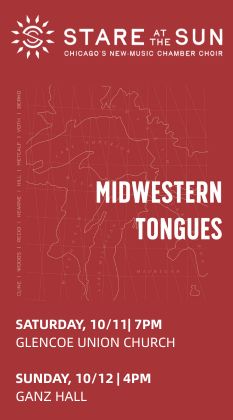


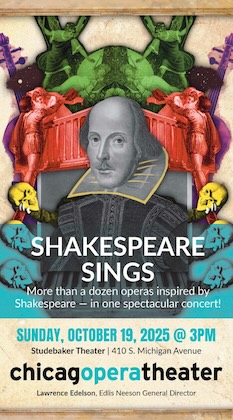

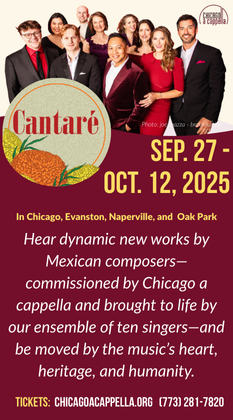
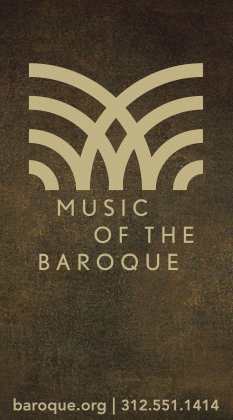
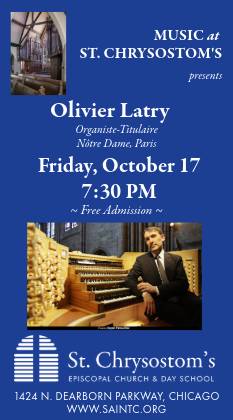
Posted Dec 04, 2018 at 1:38 pm by Yige Li
It’s great to read your review again, Mr. John von Rhein (this is just the second one here since the retirement, right?). And how beautifully it is written.
You are so correct in your observation that “Netrebko is an opera singer through and through”. Thus, I find it bit cruel using “gratuitous folly” to describe her using of props.
True that the voice and piano created a world already. The answer of “who needs sets, costumes and staging when Anna Netrebko is holding forth” is not “audience” but “Netrebko”.
She has addressed many times that, comparing to singing alone, she prefers to have partners onstage with her to interact with and that would make her performance better. In an extended sense, the props were her “acting partners”.
I understand such stage business may not be everyone’s cup of tea. If one preferred a subdued stage deportment, just close the eyes. Listening alone could satisfy you. Yet, remember that these side things might help the one onstage to shape the mood. There’s nothing need to be forgiven.
There’s a Russian documentary on Anna Netrebko in which a friend of her since conservatory years told a quite funny story. Once during an audition, Anna spontaneously began to dance when singing. The jury was, obviously, shocked and told her never to do such thing again. The spirit of that young girl has never left her.
For Anna Netrebko, to be on stage is not just about singing and performing, but also about living and enjoying–and living and enjoying FULLY. One of the great charms of Anna’s performances is that one can sense she’s enjoying the performance as mush as we audience–she’s enjoying it with us TOGETHER. This empathy is the centerpiece of her artistry crown.
I don’t know about others, but for me, every time I attend a performance of Anna Netrebko, I not only feel that I love her, love the work, love the composer, love music, but also love life itself. And every time I leave after her performance, the world feels a little more beautiful than before.
Posted Dec 04, 2018 at 1:51 pm by Bruce Tammen
I wish I could have been there! You describe the scene beautifully. Your prose, as always, is one of the delights of the Chicago classical music scene.
Posted Dec 05, 2018 at 1:32 pm by Davorin Jelacic
Excellent review! Anna’s charisma and her unmistakable joie de vivre elevate her every performance and make it truly exciting. Her voice would be enough, but no, she gives much more: all of herself in a visceral celebration of life. Her inner child seems to marvel at the world around her with contagious joy. Closing my eyes is not an option when Anna is on stage. Quite the contrary, I don’t dare to blink: odds are I’d miss something interesting.
Posted May 23, 2019 at 2:34 pm by Trevor Lynes
My favourite by Anna is her Russian arias album. She is so wholehearted in everything she does and seems to toally mesmerize her audience wherever she performs. I remember Placid Domingo saying that when he performed with her he felt that she could lead troops into battle such was her natural charisma. From a gentleman like he, that is tribute enough as he has sang with so many top sopranos through his long career.